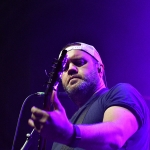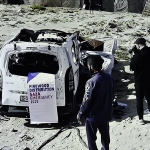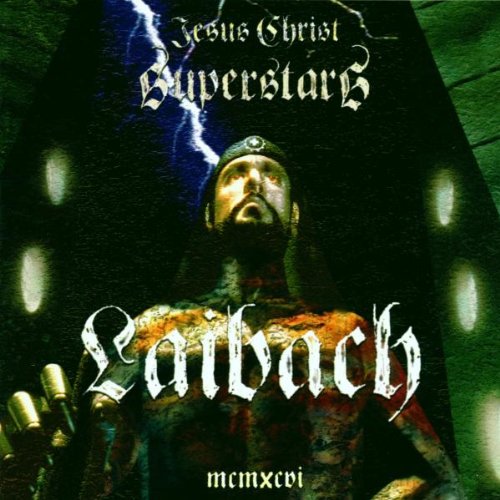The Laibach Story So Far…
1990 – 2000
As Slovenia emerged as an independent state, Laibach turned their analytical gaze to new topics, the first being the New World Order and the former Eastern Bloc’s move into the free market economy, weighty subjects examined with sly irony and a more techno-oriented sound on 1992’s “Kapital”, one of their most experimental and complex releases. The album sampled snippets of financial news reports, political speeches, science fiction films and poignant snatches of traditional Eastern European music to create a fascinating snapshot of the zeitgeist at the start of a new period in Europe’s history. This period of Laibach’s work is captured in Daniel Landin’s 1993 documentary Laibach: A Film from Slovenia (also known as Bravo), released on DVD by Mute in 2004.
To remind everyone how Laibach had developed, Mute released “Ljubljana-Zagreb-Beograd” (1993). This fascinating historical compilation covers Laibach’s politically charged activities from 1982 including their first concert, first sessions and the notorious Novi Rock performance which was originally broadcast on Slovenia’s national radio during the time of the show, creating lots of controversy. Some of the tracks here feature Laibach’s original lead singer and spokesman the late Tomaž Hostnik, as well as their early totalitarian industrial noise sound.
Taking their cue from the change and upheaval that was occurring as part of the European reunification process, Laibach (together with other NSK groups) became the founding fathers of NSK State. The world’s newest state formally announced its existence with NSK Embassy events held in Moscow (1992) and Berlin (1993). The state issued passports, stamps, and currency, and created its own flag. Laibach and their collaborators announced that the NSK is not a physical state adhering to traditional ideas of geographical borders, but rather an extra-territorial state, which peacefully co-exists within and without the host body of any pre-existing state where it chooses to temporarily materialize itself. The NSK State symbolically replaced the Neue Slowenische Kunst organization and at some events passports were required for entry although temporary visas issued by NSK staff also allowed access into this new territory. The reunification of Europe was accompanied with conflict and NATO’s unwillingness to halt the aggression in Bosnia and the nationalist disputes in ex-Yugoslavia as well as the ex-Soviet Union provided the inspiration for Laibach’s next LP, “NATO” (1994).
The album seemed aware of the paradoxes inherent in Europe’s coalition army now having to side with its former enemies and its message was largely an anti-military one delivered through a series of hilarious cover versions. This time playfully subversive martial music was generated from sources as wide reaching as Holst, the Serbian nationalist military song (“March on the Drina River”), and cover versions including Edwin Starr’s “War”, Status Quo’s “In the Army Now”, and perhaps most spectacularly, Europe’s “The Final Countdown”. With war raging throughout the former Yugoslavia the album appeared to be a very timely statement. Laibach supported the “NATO” LP with their lengthy “Occupied Europe NATO Tour 1994-95” which ended with two concerts in besieged, war-torn Sarajevo as part of their “NSK State Sarajevo” event. The tour was documented in “Occupied Europe NATO Tour 1994-95” CD/Video and DVD sets.
October 1995 saw the premiere of Michael Benson’s film on Laibach and NSK, Predictions of Fire. Filmed over several years it showed many of the major Laibach events of the first half of the nineties, exploring the ideas in their work in relation to the history of Yugoslavia and Europe.
One of the most significant concerts of Laibach’s career came in 1997, when the group performed at the opening event of the European Month of Culture in Ljubljana. Laibach appeared before the presidents of several states as well as invited diplomats and dignitaries, presenting a monumental concert even by their standards. The Slovenian Philharmonic Orchestra and a choir performed Laibach’s early heavy industrial music, orchestrated into a massive philharmonic sound that inevitably, given the group’s history, produced controversial reactions, including a walkout by the Archbishop of Ljubljana.
In 1997 Mute released another live recording from Laibach’s politically charged past. “M.B. DECEMBER 21, 1984” captured more of Laibach’s early brutal industrial noise in recordings from Ljubljana, Zagreb and their appearance at the 1985 Berlin Atonal Festival. This was followed in the autumn by the single “Jesus Christ Superstar/God is God” and the album “Jesus Christ Superstars”. The bombastic heavy metal style of the album confused many existing fans but also won over many new converts and the album would tour extensively over the next few years.
Following a European tour in the autumn Laibach toured in Europe and the USA but concluded the year with a major nine-concert tour of Ukraine, Russia, and Siberia, travelling as far as Novosibirsk and Barnaul on the Mongolian border. The last concert of 1997 took place in Belgrade, where Laibach made an emotional appearance in front of 3500 people, the first appearance since their 1989 concert. With another memorable speech by Peter Mlakar the group dramatically warned Serbs once again about their future, but unfortunately with little political effect. Miloševic and Serbia soon after started their war on Kosovo and NATO finally bombed the city and the whole country in March 1999.
The seven-year period that followed saw Laibach concentrating on side projects, occasionally taking part in recordings that were part of the Slovenian electronic scene that the group had helped to establish, and re-issuing archive material, including the “Neu Konservatiw” CD which documented a notorious live performance from Hamburg in 1985.
|
|

|

Europe |
LATEST GALLERY IMAGES

Elliot Minor 
Charity Workers Massacred |
|
|



